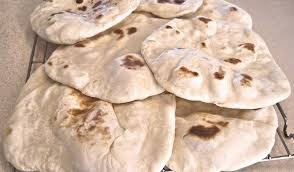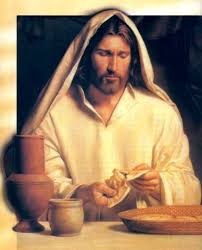Unleavened Bread

Unleavened bread is bread that is baked without yeast. It is often made because of insufficient time to allow the rising of the bread. It is bread made in haste. It was also eaten at the Passover Feast and was presented with sacrifices and offerings. Unleavened bread eaten to commemorate the Passover. Unleavened bread symbolism sincerity and truth.
Unleavened bread prepared in haste
The instruction the LORD gave to Moses the night the angel of death pass through the land and smote all the firstborn in the land of Egypt. They shall eat the flesh in that night, roast with fire, and unleavened bread; and with bitter herbs they shall eat it. They were not to eat it raw, nor sodden at all with water, but roast with fire; his head with his legs, and with the purtenance thereof. There shall let nothing of it remain until the morning. If there were any remained it shall be burnt with fire in the morning. They were to eat with their loins girded, shoes on their feet and their staff in their hand; they shall eat it in haste: it is the Passover of the LORD. (Exodus 12:8-11).
The children of Israel baked unleavened cakes of the dough which they brought forth out of Egypt, for it was not leavened; because they were thrust out of Egypt, and could not tarry, neither had they prepared for themselves any victual. (Exodus 12:39).
And there came two angels to Sodom at even; and Lot sat in the gate of Sodom: and Lot seeing them, he rose up to meet them; and he bowed himself with his face toward the ground. Lot ask the angels into his home to spend the night and made them a feast and bake unleavened bread, and the angel did eat. (Genesis 19:1-3).
Gideon said into the LORD if the LORD had found grace in His sight Gideon wanted a sign. While Gideon was going to bring a present and set it before the LORD. Gideon went in, and made ready a kid, and unleavened cakes of an ephah of flour: the flesh he put in a basket, and he put the broth in a pot, and brought it out unto him under the oak, and presented it. (Judges 6:17-19).
A woman came unto Saul, and saw that he was in troubled, and said unto him, She asked permission to make Saul a morsel of bread for set it before him to eat, that Saul might gain his strength and go his way. Saul refused, and said, he would not eat. But his servants, together with the woman, compelled him; and he hearkened unto their voice. So he arose from the earth, and sat upon the bed. And the woman had a fat calf in the house; and she hasted, and killed it, and took flour, and kneaded it, and did bake unleavened bread. She brought it before Saul, and before his servants; and they did eat. Then they rose up, and went away that night. (1 Samuel 28:21-25).
Unleavened Bread Eaten to Commemorate the Passover
The instruction the LORD gave to Moses the night the angel of death pass through the land and smote all the firstborn in the land of Egypt. They shall eat the flesh in that night, roast with fire, and unleavened bread; and with bitter herbs they shall eat it. They were not to eat it raw, nor sodden at all with water, but roast with fire; his head with his legs, and with the purtenance thereof. There shall let nothing of it remain until the morning. If there were any remained it shall be burnt with fire in the morning. They were to eat with their loins girded, shoes on their feet and their staff in their hand; they shall eat it in haste: it is the Passover of the LORD. (Exodus 12:8-11). Seven days they shall eat unleavened bread. The first day they shall put away leaven out of their houses. Whosoever eats leavened bread from the first day until the seventh day that soul shall be cut off from Israel. The first day there shall be an holy convocation, and in the seventh day there shall be an holy convocation to you; no manner of work shall be done in them, save that which every man must eat, that only may be done of you. You shall observe the feast of unleavened bread; for in this selfsame day the LORD God brought your armies out of the land of Egypt. Therefore shall you observe this day in your generations by an ordinance forever. The first month, on the fourteenth day of the month at even, ye shall eat unleavened bread, until the one and twentieth day of the month at even. Seven days shall there be no leaven found in your houses: for whosoever eats that which is leavened, even that soul shall be cut off from the congregation of Israel, whether he be a stranger, or born in the land (Exodus 12:15-19; Exodus 34:18).
The people took their dough before it was leavened, their kneading troughs being bound up in their clothes upon their shoulders. And they baked unleavened cakes of the dough which they brought forth out of Egypt, for it was not leavened; because they were thrust out of Egypt, and could not tarry, neither had they prepared for themselves any victual. (Exodus 12: 34, 39).
Moses said unto the people, Remember this day, in which ye came out from Egypt, out of the house of bondage; for by strength of hand the LORD brought you out from this place: there shall no leavened bread be eaten. The day you came out in the month Abib. It shall be when the LORD shall bring them into the land of the Canaanites, and the Hittites, and the Amorites, and the Hivites, and the Jebusites, which he swore unto your fathers to give you, a land flowing with milk and honey, that you shall keep this service in this month. Seven days you shall eat unleavened bread, and in the seventh day shall be a feast to the LORD. Unleavened bread shall be eaten seven days; and there shall no leavened bread be seen with you, neither shall there be leaven seen with you in all your quarters. (Exodus 13:3–7).
And the LORD spoke unto Moses, saying, for him to speak unto the children of Israel, saying, If any man of you or of your posterity shall be unclean by reason of a dead body, or be in a journey afar off, yet he shall keep the Passover unto the LORD. The fourteenth day of the second month at even they shall keep it, and eat it with unleavened bread and bitter herbs. They shall leave none of it unto the morning, nor break any bone of it: according to all the ordinances of the Passover they shall keep it. (Numbers 9:9-12).
The fourteenth day of the first month is the Passover of the LORD. The fifteenth day of this month is the feast: seven days shall unleavened bread be eaten. (Numbers 28:16-17).
The month of Abib the LORD your God brought you forth out of Egypt by night. You shall therefore sacrifice the Passover unto the LORD your God, of the flock and the herd, in the place which the LORD shall choose to place his name there. You shall eat no leavened bread with it; seven days shall you eat unleavened bread therewith, even the bread of affliction; for you came forth out of the land of Egypt in haste: that you may remember the day when you came forth out of the land of Egypt all the days of your life. There shall be no leavened bread seen with your in all your coast seven days; neither shall there anything of the flesh, which you sacrificed the first day at even, remain all night until the morning. You may not sacrifice the Passover within any of your gates, which the LORD thy God gives you. But at the place which the LORD your God shall choose to place his name in, there you shall sacrifice the Passover at even, at the going down of the sun, at the season that you came forth out of Egypt. (Leviticus 23:6; Deuteronomy 16:1–6).
And the priest shall take of the blood of the sin offering, and put it upon the posts of the house, and upon the four corners of the settle of the altar, and upon the posts of the gate of the inner court. You shall do the seventh day of the month for every one that errs, and for him that is simple: so shall you reconcile the house. The first month, in the fourteenth day of the month, you shall have the Passover, a feast of seven days; unleavened bread shall be eaten. (Ezekiel 45:19-21)
It was at the feast of Unleavened Bread when Judas Iscariot betrayed Jesus. Then came the day of unleavened bread, the Passover lamb was sacrificed. Jesus is our sacrificial lamb. (Luke 22:1, 7).
Unleavened bread presented to God as an offering
Meat Offering:
When you bring an oblation of a meat offering baked in the oven, it shall be unleavened cakes of fine flour mingled with oil, or unleavened wafers anointed with oil. When the oblation be a meat offering baked in a pan, it shall be of fine flour unleavened, mingled with oil.-the cereal offering should be unleavened. (Leviticus 2:4- 5).
No meat offering, which you shall bring unto the LORD, shall be made with leaven: for you shall burn no leaven, nor any honey, in any offering of the LORD made by fire. As for the oblation of the first fruits, you shall offer them unto the LORD: but they shall not be burnt on the altar for a sweet savor. (Leviticus 2:11-12).
This is the law of the meat offering: the sons of Aaron shall offer it before the LORD, before the altar. He shall take of it his handful, of the flour of the meat offering, and of the oil thereof, and all the frankincense which is upon the meat offering, and shall burn it upon the altar for a sweet savor, even the memorial of it, unto the LORD. The remainder thereof shall Aaron and his sons eat: with unleavened bread shall it be eaten in the holy place; in the court of the tabernacle of the congregation they shall eat it. It shall not be baked with leaven. The LORD God has given it unto them for their portion of my offerings made by fire; it is most holy, as is the sin offering, and as the trespass offering. (Leviticus 6:14-17).
Peace Offerings:
The law of the sacrifice of peace offerings, which he shall offer unto the LORD. When it is offered for a thanksgiving, then he shall offer with the sacrifice of thanksgiving unleavened cakes mingled with oil, and unleavened wafers anointed with oil, and cakes mingled with oil, of fine flour, fried. (Leviticus 7:11-12).
Sin Offering:
The LORD spoke unto Moses, saying to take Aaron and his sons with him, and the garments, and the anointing oil, and a bullock for the sin offering, and two rams, and a basket of unleavened bread. Gather all the congregation together unto the door of the tabernacle of the congregation. (Leviticus 8:1-3).
Wave Offering:
Moses took the fat, and the rump, and all the fat that was upon the inwards, and the caul above the liver, and the two kidneys, and their fat, and the right shoulder: out of the basket of unleavened bread, that was before the LORD, he took one unleavened cake, and a cake of oiled bread, and one wafer, and put them on the fat, and upon the right shoulder. Moses put all upon Aaron’s hands, and upon his sons’ hands, and waved them for a wave offering before the LORD. And Moses took them from off their hands, and burnt them on the altar upon the burnt offering: they were consecrations for a sweet savor: it is an offering made by fire unto the LORD. (Leviticus 8:25-28; Exodus 29:22-25).
Symbolism of Unleavened Bread
Your boasting is not good. Know you not that a little leaven leavens the whole lump? Purge out therefore the old leaven that you may be a new lump, as you are unleavened. For even Christ our Passover is sacrificed for us. Therefore let us keep the feast, not with old leaven, neither with the leaven of malice and wickedness; but with the unleavened bread of sincerity and truth. (1 Corinthians 5:6-8).
Cite Article Source
MLA Style Citation:
Holstein, Joanne “Unleavened Bread:.” Becker Bible Studies Library Feb 2015.< https://guidedbiblestudies.com/?p=2354,>.
APA Style Citation:
Holstein, Joanne (2015, February) “Unleavened Bread:.” Becker Bible Studies Library. Retrieved from https://guidedbiblestudies.com/?p=2354,.
Chicago Style Citation:
Holstein, Joanne (2015) “Unleavened Bread:.” Becker Bible Studies Library (February), https://guidedbiblestudies.com/?p=2354, (accessed).


